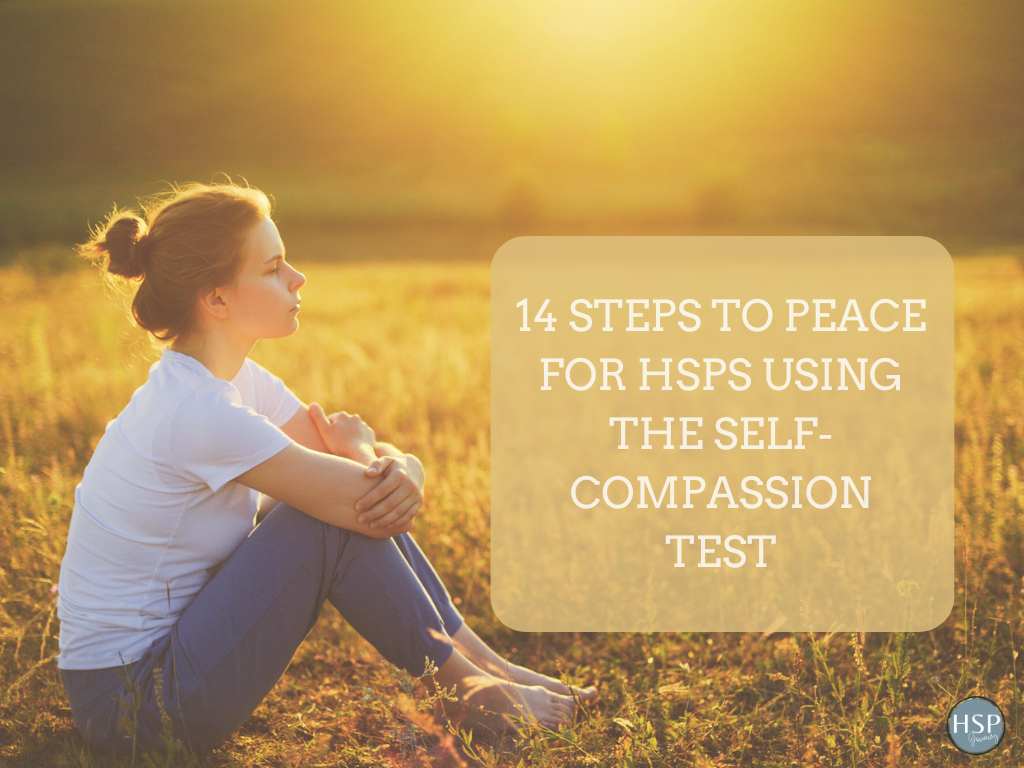Struggling with self-criticism? Does your inner critic chatter in your ear every time you make a mistake or misstep? Taking the self-compassion test can help you assess how kind you are to yourself during difficult times. Taking this research-based assessment provides valuable insights into your levels of self-kindness, common humanity, and mindfulness – the three core components of self-compassion that are scored in the self-compassion test.
Dr. Kristin Neff developed and validated the Self-Compassion Scale to measure these factors. Her work has shown that cultivating self-compassion can significantly improve mental health and wellbeing across diverse populations.
Curious about your own self-compassion levels? Taking the test is quick and enlightening. You’ll discover areas where you excel at being compassionate to yourself, as well as opportunities for growth. This knowledge can guide you towards developing a kinder inner voice and more balanced perspective during life’s challenges.

Table of Contents
#1 – Understanding the Self-Compassion Test for Highly Sensitive People
The self-compassion test for highly sensitive people (HSPs) offers valuable insights into your relationship with yourself. It can help you develop greater self-awareness and emotional resilience.
What it is And How it Benefits HSPs
The self-compassion test for HSPs is a specialized assessment tool designed to measure your level of self-kindness and understanding. It consists of questions that explore how you treat yourself during challenging times or when facing personal shortcomings.
As an HSP, you may often be hard on yourself due to your heightened sensitivity. This test can help you identify areas where you might be overly critical. By taking the assessment, you’ll gain awareness of your self-talk patterns and emotional responses.
The benefits for HSPs are significant. You’ll learn to recognize when you’re being too harsh on yourself and develop strategies for self-soothing. This can lead to reduced anxiety and stress, as well as improved emotional regulation.
The test results can guide you in cultivating a more compassionate inner voice. You’ll discover practical ways to show yourself kindness, especially during overwhelming moments common to HSPs.
#2 – How the Self-Compassion Test Can Improve Emotional Resilience in HSPs
The self-compassion test can be a powerful tool for Highly Sensitive Persons (HSPs) to build emotional resilience. By identifying areas for growth, you can develop strategies to better manage intense emotions and reactions.
Exploring the Link Between Self-Compassion and Emotional Regulation
Self-compassion plays a crucial role in emotional regulation for HSPs. When you’re feeling down, practicing self-compassion can help you bounce back more quickly. The test highlights your strengths and weaknesses in self-kindness, allowing you to focus on areas that need improvement.
By cultivating self-compassion, you learn to treat yourself with the same kindness you’d offer a friend. This shift in perspective can be transformative for HSPs who often struggle with self-criticism.
The test also measures your ability to recognize common humanity. This awareness helps you feel less isolated when experiencing difficult emotions. You’ll start to see that others face similar challenges, reducing feelings of loneliness or inadequacy.
Mindfulness, another component of self-compassion, aids in keeping your emotions in balance. The test assesses your mindfulness skills, guiding you towards practices that can enhance your emotional resilience.
#3 – Self-Compassion Test Results: What They Mean for HSPs
Self-compassion test scores offer valuable insights for highly sensitive people. Your results can guide you toward greater self-understanding and emotional well-being.
Interpreting Your Score and Applying it to Your Life as a Sensitive Person
Your self-compassion scale (SCS) score reveals how kindly you treat yourself. As an HSP, a high score suggests you’re adept at soothing your heightened emotions. You likely practice self-kindness, recognize shared human experiences, and maintain mindfulness.
A lower score doesn’t mean failure. It highlights areas where you can grow. You might focus on being gentler with yourself during overwhelming moments. Try acknowledging that your sensitivity is a common trait, not a personal flaw.
The compassion scale can complement your SCS results. It measures how you extend kindness to others. HSPs often score high here due to their empathetic nature.
Remember, these tests are tools for growth, not judgment. Use your results to identify strengths and areas for improvement in your self-care routine. Regular self-compassion quizzes can track your progress over time.
Small steps make a big difference. Start by treating yourself as you would a dear friend. Your sensitivity is a gift – nurture it with compassion.

#4 – Using the Self-Compassion Test to Overcome Self-Criticism as an HSP
The self-compassion test can be a powerful tool for Highly Sensitive Persons (HSPs) to recognize and address their self-critical tendencies. By identifying areas where you may be harsh on yourself, you can begin to cultivate a kinder inner voice.
Shifting From Judgment to Kindness in Your Internal Dialogue
As an HSP, you may often find yourself being tough on yourself, focusing on perceived flaws and inadequacies. The self-compassion test helps you recognize these patterns of self-criticism. When you notice negative self-talk, pause and take a deep breath. Ask yourself if you’d speak to a friend this way.
Try reframing your thoughts with kindness. Instead of “I’m such a failure,” say “I’m learning and growing.” Acknowledge that everyone makes mistakes and has difficulties. This doesn’t mean you’re inadequate; it means you’re human.
Practice self-soothing techniques when you feel overwhelmed by self-judgment. Use gentle touch, like placing a hand on your heart, or speak to yourself with words of comfort. Remember, your sensitivity is a strength, not a weakness.
Set small, achievable goals to build confidence. Celebrate your successes, no matter how small. This helps shift your focus from perceived shortcomings to your capabilities and progress.
#5 – Why the Self-Compassion Test Matters for HSPs Struggling With Perfectionism
The self-compassion test can be a powerful tool for highly sensitive people (HSPs) grappling with perfectionism. It offers insights into how you treat yourself during challenging times.
Letting Go of Unrealistic Expectations with the Help of Self-Compassion
As an HSP, you might often find yourself struggling with perfectionism. You may obsess over every detail, fixate on mistakes, and be overly judgmental of your performance. This can lead to a constant feeling of disappointment and self-criticism.
The self-compassion test helps you recognize these patterns. It highlights areas where you might be too harsh on yourself. By identifying these tendencies, you can start to shift your mindset.
Self-compassion encourages you to treat yourself with kindness, rather than disapproval. It teaches you to view mistakes as learning opportunities instead of failures. This perspective can be incredibly freeing for HSPs who often set unrealistically high standards.
Remember, perfection is an impossible goal. The self-compassion test reminds you that it’s okay to be human. It helps you embrace your sensitive nature without constantly judging yourself.
#6 – The Self-Compassion Test: A Tool for HSPs to Navigate Overwhelm and Burnout
The Self-Compassion Test helps Highly Sensitive Persons (HSPs) recognize and address overwhelm and burnout. It provides insights into your emotional well-being and coping strategies.
Recognizing Signs of Compassion Fatigue and Addressing Them
As an HSP, you may experience compassion fatigue more intensely than others. This can manifest as emotional exhaustion, decreased empathy, or a sense of isolation. The Self-Compassion Test can help you identify these signs early.
Pay attention to your energy levels and emotional responses. Are you feeling drained after social interactions? Do you find yourself withdrawing from others? These could be indicators of compassion fatigue.
The test encourages self-reflection on your mental health. It prompts you to consider how you treat yourself during difficult times. Are you kind to yourself, or do you engage in harsh self-criticism?
By recognizing over-identification with others’ emotions, you can learn to set healthy boundaries. The test helps you assess your ability to maintain a balanced perspective.
Use the results to develop personalized self-care strategies. This might include scheduling regular alone time, practicing mindfulness, or seeking support from a therapist.

Looking for an HSP-Trained coach to help you align your life with your priorities?
Through my Highly Sensitive Person (HSP) certification with the Nickerson Institute, as well as being an HSP, I offer HSP coaching to develop specific goals around your HSP needs. We HSPs frequently deal with anxiety and overstimulated nervous systems that prevent us from achieving peace and attaining our life goals. HSP coaching with me includes a detailed review of your sensitivities and a mutually-desired plan for growth and management of this superpower to shift negativity and begin seeing yourself as the hero of your own story. (Affordable monthly coaching begins at $150/month.)
Remember, taking care of yourself is crucial. The Self-Compassion Test can guide you towards a more balanced and compassionate approach to your own well-being.
#7 – How HSPs Can Use the Self-Compassion Test to Build Self-Awareness
Taking the self-compassion test can help highly sensitive people gain valuable insights into their inner experiences. It provides a framework for exploring your emotional landscape and sensitivity.
Deepening Your Understanding of Your Sensitivity and Emotional Needs
As an HSP, the self-compassion test allows you to examine how you respond to challenging situations. You can reflect on whether you tend to be self-critical or kind to yourself during difficult times. This awareness helps you develop a more balanced view of your experiences.
The test encourages mindfulness by prompting you to observe your thoughts and feelings without judgment. You might notice patterns in how you react to stress or overwhelm. This curiosity about your inner world can lead to greater self-acceptance.
By answering the test questions, you can explore your openness to your own suffering. Do you acknowledge your pain, or do you try to push it away? This insight can guide you in cultivating a gentler approach to your sensitivity.
Use the test results as a starting point for self-reflection. You might discover areas where you can be more compassionate towards yourself. This knowledge empowers you to nurture your emotional needs as an HSP.
Looking for HSP Tools to Thrive in a Chaotic World?
The modern world is often overwhelming and stressful for those of us with sensitive nervous systems. Many of us have suffered from the challenges of high stress, anxiety, sensory overload, and mental health and physical health issues. Fortunately, after years of working with and researching Highly Sensitive People (HSPs), Julie Bjelland has developed many tools that have not only helped her but thousands of HSPs all over the world move out of survival mode living and into thriving. In this free webinar, she’ll share the tools that HSPs have found the most life-changing. Her goal is to help you live to your fullest potential because the world needs you.
Join this free webinar and get tools to help you thrive as an HSP!
#8 – Taking the Self-Compassion Test During Stressful Seasons as an HSP
As a Highly Sensitive Person (HSP), navigating stressful seasons can be particularly challenging. Taking a self-compassion test during these times can provide valuable insights and coping strategies.
Finding Peace and Balance During Emotionally Demanding Times
When you’re feeling overwhelmed, a self-compassion test can help you refocus on self-care. Start by setting aside a quiet moment to engage with the test questions. As you respond, be honest with yourself about your thoughts and feelings.
Pay attention to how you react to stressful situations. Do you tend to be overly critical of yourself? The test may reveal areas where you can practice more self-kindness. Remember, it’s okay to struggle sometimes.
Try incorporating brief moments of mindfulness throughout your day. This can help you stay grounded when emotions run high. Even a few deep breaths can make a difference.
Consider reaching out to supportive friends or family members. Sharing your experiences can help you feel less alone and more understood. Your heightened sensitivity is a strength, allowing you to deeply engage with the world around you.
#9 – Self-Compassion Test Insights for HSPs: Creating a More Supportive Environment
Self-compassion tests can provide valuable insights for highly sensitive people (HSPs) to create nurturing environments. By understanding your unique needs, you can design a life that honors and supports your sensitivity.
Designing a Life That Nurtures Your Sensitivity
As an HSP, your environment greatly influences your well-being. Consider creating a calm, clutter-free space at home to reduce sensory overload. Soft lighting, soothing colors, and comfortable textures can help you feel more at ease.
Establish boundaries to protect your energy. It’s okay to say no to social events or commitments that drain you. Instead, prioritize activities that recharge your batteries, like spending time in nature or engaging in creative pursuits.
Develop a self-care routine tailored to your needs. This might include regular meditation, journaling, or gentle exercise. Pay attention to your body’s signals and give yourself permission to rest when needed.
Surround yourself with supportive people who understand and respect your sensitivity. Seek out connections with fellow HSPs who can relate to your experiences and offer empathy.
#10 – The Connection Between the Self-Compassion Test and Healthy Boundaries for HSPs
Self-compassion tests can help highly sensitive people (HSPs) recognize their needs and set healthy boundaries. These assessments provide insights into self-care practices and emotional well-being.
Learning to Prioritize Your Well-Being Through Compassionate Boundary-Setting
As an HSP, you may find it challenging to establish boundaries, especially if you’re often impatient with yourself or intolerant of your own needs. The self-compassion test can reveal areas where you struggle to prioritize your well-being.
By identifying these patterns, you can start developing healthier boundaries. For example, if the test shows you’re hard on yourself for needing alone time, practice saying “no” to social invitations when you’re overwhelmed.
Remember, setting boundaries isn’t selfish – it’s essential self-care. Try using “I” statements to express your needs clearly and kindly. For instance, “I need some quiet time to recharge” instead of “You’re too loud.”
Regularly reassess your boundaries using the self-compassion test. This will help you track your progress and adjust as needed. Be patient with yourself as you learn this new skill. It takes time to change old habits, but the benefits for your well-being are worth it.
#11 – How HSPs Can Use the Self-Compassion Test to Cultivate Inner Peace
Highly Sensitive People (HSPs) can benefit greatly from incorporating self-compassion practices into their daily lives. The self-compassion test provides valuable insights to help you nurture inner peace and emotional wellbeing.
Leveraging Self-Compassion to Create a Calm and Centered Life
As an HSP, you may often feel overwhelmed by the world around you. Self-compassion can be your anchor in turbulent times. By embracing your sensitivity as part of the human condition, you’ll cultivate a more tolerant and patient attitude towards yourself.
Start by taking the self-compassion test to identify areas where you can grow. Use the results to develop a personalized self-care routine. This might include daily affirmations, mindfulness exercises, or journaling.
Remember, self-compassion isn’t about perfection. It’s about treating yourself with the same kindness you’d offer a friend. When you stumble, acknowledge your humanity and offer yourself understanding.
Practice self-soothing techniques when you feel overwhelmed. Deep breathing, gentle touch, or positive self-talk can help you regain your center. By consistently applying self-compassion, you’ll build resilience and find greater happiness in your daily life.
#12 – The Role of the Self-Compassion Test in Healing Past Wounds for HSPs
The self-compassion test offers Highly Sensitive People (HSPs) a powerful tool for addressing and healing emotional wounds from the past. It provides a framework for approaching painful experiences with kindness and understanding.
Addressing Old Hurts with Kindness and Understanding
As an HSP, you may carry deep emotional scars from past experiences. The self-compassion test helps you recognize these wounds without judgment. It encourages you to view your suffering through a lens of self-kindness rather than self-criticism.
By taking the test, you learn to acknowledge your pain without shame. This shift in perspective can ease symptoms of depression and anxiety often linked to unresolved trauma.
The test guides you towards self-forgiveness, a crucial step in healing. It teaches you to treat yourself with the same compassion you’d offer a friend facing similar struggles.
For HSPs, who often feel things intensely, this approach is particularly beneficial. It helps you process emotional pain without becoming overwhelmed.
Remember, healing is a journey. The self-compassion test serves as a compass, guiding you towards greater self-acceptance and emotional well-being.
#13 – Building a Self-Compassionate Mindset: What the Test Teaches HSPs
The self-compassion test offers valuable insights for Highly Sensitive Persons (HSPs) to cultivate a kinder relationship with themselves. It highlights areas where you can nurture self-acceptance and replace harsh self-criticism with understanding.
Moving from Self-Doubt to Self-Acceptance
As an HSP, you may often struggle with self-doubt. The test helps you recognize when you’re being overly critical of yourself. It encourages you to treat yourself with the same kindness you’d offer a friend.
Try reframing negative self-talk into more compassionate language. Instead of “I’m so stupid for making that mistake,” try “Everyone makes mistakes sometimes. What can I learn from this?”
Practice acknowledging your feelings without judgment. When you’re overwhelmed, remind yourself it’s okay to feel this way. Your sensitivity is a strength, not a weakness.
Set realistic expectations for yourself. Perfection isn’t the goal – progress is. Celebrate small victories and be patient with your growth process.
Remember, self-acceptance doesn’t mean ignoring areas for improvement. It means approaching your flaws with understanding and a willingness to grow.
#14 – How the Self-Compassion Test Can Empower HSPs to Thrive in Relationships
The self-compassion test provides valuable insights for Highly Sensitive Persons (HSPs) to navigate relationships more effectively. It helps you understand your own needs and tendencies, allowing for greater self-awareness and emotional balance.
Nurturing Yourself While Navigating Sensitive Connections
As an HSP, you may find relationships particularly challenging due to your heightened sensitivity. The self-compassion test can help you identify areas where you need more self-care and understanding.
By recognizing your sensitivity as a strength, you can learn to set healthy boundaries without feeling guilty. This awareness allows you to communicate your needs more clearly to partners, friends, and family.
The test encourages you to treat yourself with kindness, especially during difficult interactions. This self-compassion can boost your confidence in social situations and reduce anxiety about potential conflicts.
You’ll learn to validate your own experiences and emotions, rather than dismissing them as “too sensitive.” This self-validation leads to increased life satisfaction and more authentic connections with others.
Practicing self-compassion also helps you recharge after intense social interactions. You’ll feel more comfortable taking time for yourself without feeling selfish or disconnected from loved ones.
By embracing your sensitive nature through self-compassion, you can create more fulfilling and balanced relationships. You’ll be better equipped to offer empathy and support to others while still caring for your own emotional well-being.
Frequently Asked Questions
Self-compassion tests offer valuable insights into your relationship with yourself. These assessments can help you better understand your self-perception and emotional responses.
What are the components included in the self-compassion scale?
The self-compassion scale typically measures six key components. These include self-kindness, self-judgment, common humanity, isolation, mindfulness, and over-identification. Each component assesses a different aspect of how you treat yourself during challenging times.
How can one go about interpreting the results from a self-compassion test?
Interpreting your results involves examining your scores across different components. Higher scores in self-kindness, common humanity, and mindfulness indicate greater self-compassion. Lower scores in self-judgment, isolation, and over-identification also suggest higher self-compassion levels.
What online tools are available for measuring self-compassion for free?
Several free online tools can help you measure your self-compassion. The Self-Compassion Test by Dr. Kristin Neff is a popular option. Some psychology websites and mental health apps also offer free self-compassion assessments.
How is the 26-item self-compassion scale used in self-assessment?
The 26-item self-compassion scale is a comprehensive tool for self-assessment. You’ll respond to statements about your thoughts and behaviors using a 5-point scale. This scale covers all six components of self-compassion, providing a detailed picture of your self-compassionate tendencies.
Be sensitive, be free
*This post contains affiliate links and I will be compensated if you make a purchase after clicking on my links*





[…] relax and unwind. Take care of your highly sensitive self by purchasing this massage pad for your HSP self-care […]